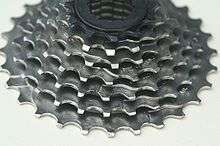Hyperglide

Hyperglide is the name given to the series of ramps in bicycle derailleur tooth cassette systems. It varies gear tooth profiles, and/or pins along the faces of freewheel or cassette sprockets, or between the chainrings in a crankset, to ease shifting between them.
Development
The design, developed by Shimano, improves on their earlier Uniglide design (which used beveled gear teeth instead of ramps), and was introduced as part of a commercially viable index shifting system. The Hyperglide ramps, along with laterally floating derailleur jockey wheels, allows for enough "slop" in the system to make indexed shifting reliable, despite variations in shift cable adjustment and manufacturing or assembly tolerances. A Hyperglide freewheel or cassette on a bike with friction shifters can further improve shifting.
Design
The individual sprockets on a Hyperglide cassette or freewheel are designed specifically to work with their neighbors. For example, the 18-tooth sprocket on a wide-range cassette (such as one for a mountain bike) will have a different ramp pattern than the 18-tooth sprocket on a narrow-range cassette, because the number of teeth on the neighboring sprocket requires a different ramp pattern for an optimal shift. As a result, cassettes are sold as a cohesive unit—rather than as individual sprockets—with all the sprockets on a given cassette designed to work with each other. However, some mixing and matching is possible for a custom gear range, as long as all the sprockets' ramps are compatible.
In order to ensure alignment of each sprocket with its neighbour, the freehub has a narrow spline at one position, and each sprocket has a corresponding wide tooth on its inside face.


External links
- HyperGlide Technology at shimano.com